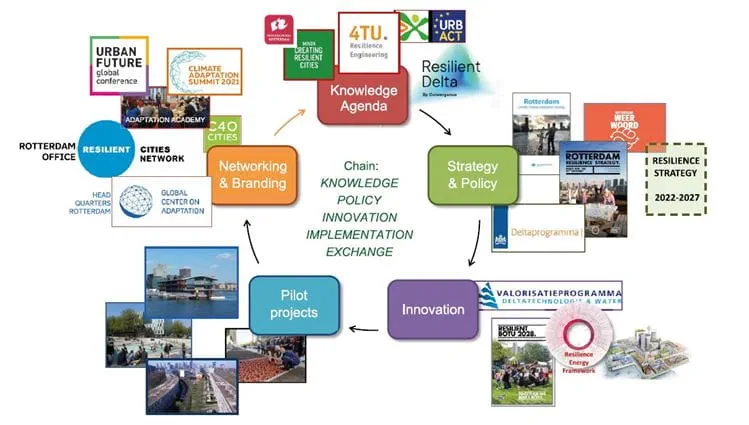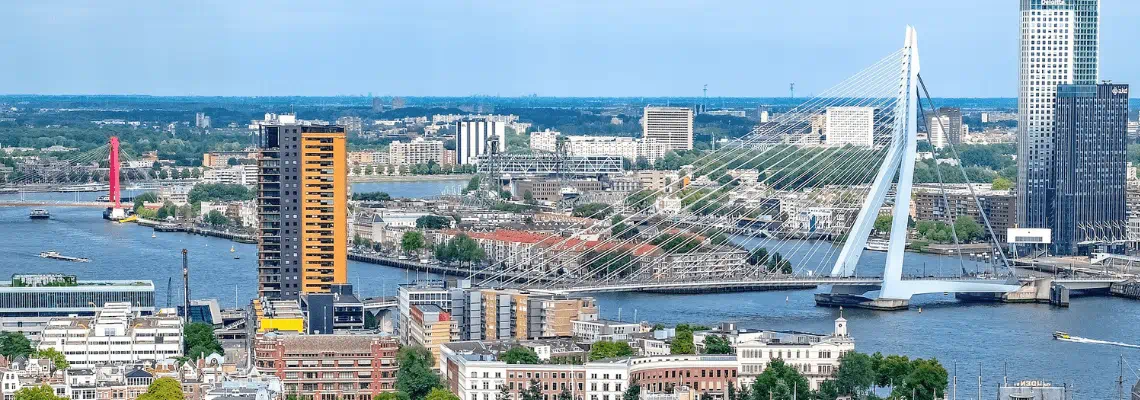Dutch city Rotterdam is known for its forward thinking on climate adaptation but what is its next strategy? We investigate the new 2022-2027 strategy.
Addressing three major planetary crises
A delta city that lives with the threat of flooding, Rotterdam has always had to be ahead of the game when it comes to climate adaptation.
With 80% of the city beneath sea level, Rotterdam was one of the first cities in the world to develop a climate-adaptive approach in 2013.
The first integrated approach to make the city strong and resilient followed a few years later in 2016: the Resilience Strategy.
Now the City of Rotterdam has launched its 2022-2027 strategy: ‘From risks to resilience’.
Rotterdam has become vulnerable to heat stress and heavy rainfall, unable to currently absorb enough water.
The strategy report has been developed to help overcome six crises: three major planetary crises (the climate, biodiversity and the natural resources and pollution), and also three social-economic crises (inequality, health and cyber).
Water is, as expected, a key theme throughout the report.
Arno Bonte, vice mayor for sustainability, air quality, energy transition and resilience, said: “We have managed to protect the city against high water and heavy rainfall more effectively in recent years. Partly as a result of the introduction of water squares and green roofs.
“We are making the city greener in streets and neighbourhoods, on squares and on roofs and, together with residents, we’re making sure vulnerable homes are kept dry.”
Adapting for the climate crisis
Under the “climate crisis” category, the report highlighted the sea level rise forecast up to the year 2100, revised from one to 1.2 meters, citing how this will directly “influence water levels in the city”.
Furthermore, Rotterdam has become vulnerable to heat stress and heavy rainfall, unable to currently “absorb enough water”.
In a previous Aquatech Online ‘Breakouts’ session, Arnoud Molenaar, chief resilience officer for the City of Rotterdam discussed how climate adaptation has always been on the city’s agenda since 2008, and how he helped to design a holistic strategy.
As one of Europe’s largest petrochemical clusters, Rotterdam became an international port due to the river and close proximity to the sea.
It was referenced for the potential difference it can make in the reduction of PFAS, nitrogen, asbestos and fine and ultra-fine particles.
Under the “cyber crisis”, the report added that Rotterdam is also potentially “vulnerable to the hacking of water infrastructure as a result of its vulnerable location in relation to water”.
The resilient Rotterdam ‘ecosystem’
The report also highlighted ambitions to continue strengthening the international ‘Resilient Rotterdam’ brand.
“Rotterdam, together with Rotterdam Partners, among others, will continue to make use of the ‘Resilient Rotterdam brand’, making sure it continues to contribute to further growth of the corresponding ecosystem and strengthening Rotterdam’s international profile.”

The example of the arrival of the Global Center on Adaptation was referenced as one example, leading to new conferences, delegations and institutes.
In the report foreword, Ahmed Aboutaleb, Mayor of Rotterdam, said: “The pandemic has certainly taught us that we need to be better prepared for future crises. Of course we can’t prevent everything, but we can make sure that the impact is less significant and that we’ll recover faster: a Resilient Rotterdam.”
More information on the strategy and a copy of the report can be found here.







